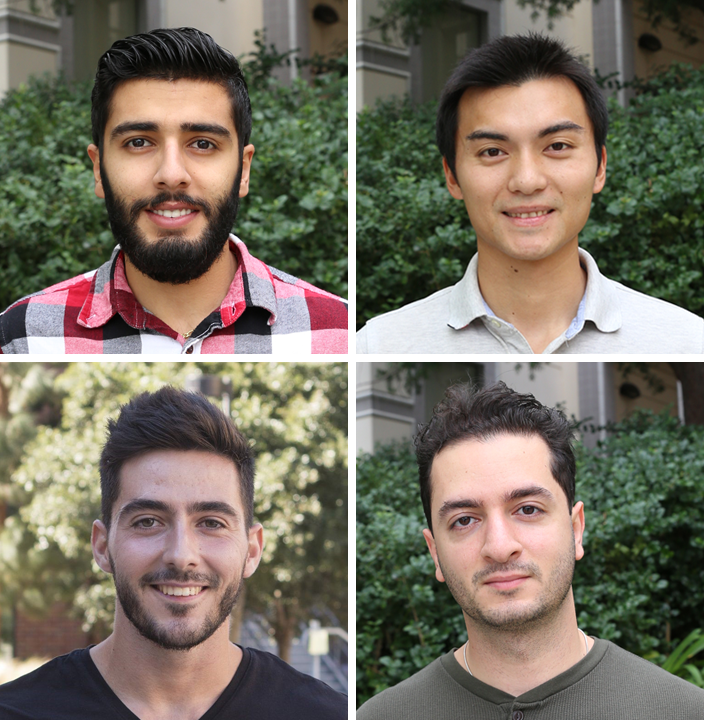Four Grad Students Win Holmes Fellowships
 Dec. 18, 2019 - Four doctoral students in the Samueli School’s mechanical and aerospace engineering and electrical engineering departments have won 2019-20 Paul and Beverly Holmes Endowed Fellowships, which include fees, non-resident tuition and a monthly stipend, to support their graduate studies. They are Ali Abdallah, Chi-Shih (Chico) Jao, Ivan Martinez I Cano and Navid Rezazadeh.
Dec. 18, 2019 - Four doctoral students in the Samueli School’s mechanical and aerospace engineering and electrical engineering departments have won 2019-20 Paul and Beverly Holmes Endowed Fellowships, which include fees, non-resident tuition and a monthly stipend, to support their graduate studies. They are Ali Abdallah, Chi-Shih (Chico) Jao, Ivan Martinez I Cano and Navid Rezazadeh.
The fellowship is available to EECS and MAE students who have a demonstrated background and interest in flight systems navigation. The winners were selected based on their academic records and their research’s direct connection to the technology and theory of navigation and guidance devices.
Abdallah, whose adviser is Zak Kassas, assistant professor of mechanical and aerospace engineering, is developing an infrastructure-free indoor localization system for first responders. His proposed approach uses ambient cellular long-term evolution (LTE) signals and advanced signal-processing algorithms to localize emergency responders and/or other users in large indoor spaces like malls and airports in an accurate and affordable way.
“I was excited to receive this prestigious scholarship and for being rewarded for the hard work that I have put in so far. I look forward to using this fellowship to make progress on a research topic I am passionate about and whose outcome can save lives,” Abdallah said, adding, “I would like to take this opportunity to thank my advisor, Professor Zak Kassas, whose supervision and guidance is helping me achieve my best. I would also like to thank the Holmes Fellowship committee for offering me this prestigious scholarship.”
Cano uses a technology called CubeSats, very small satellites designed for specific tasks in space, to help him design small satellite trajectories. Because CubeSats are so small, they cannot carry much propellant, so he designs optimal routes in space that take advantage of the gravity of bodies like the sun, moon or the Earth itself. “The capability of sending small satellites far into space can help humanity explore space as well as reduce the carbon footprint in space,” he said. “Small satellites imply less material use, and if the mission fails, space debris is minimal.”
Cano, who is advised by Professor Kenneth Mease, said he was very excited when Mease notified him about the fellowship. “I really like my research topic, but in the future, I will have to [be a teaching assistant] to pay tuition and fees. And that will take some time from the research. I really want to do a good job, and being able to have more time to dedicate to the research motivates me to do a better job.” He added, “I really want to thank the school, the Holmes Foundation, my adviser and everyone who believed in me for such a great opportunity.”
Jao is an MAE student advised by Professor Andrei Shkel. His research focuses on pedestrian inertial navigation systems, which can determine location in environments where GPS signals or signals of opportunity are not available. “The development of such systems is particularly important for first responders or firefighters,” Jao said.
“I am incredibly honored to receive the Holmes Fellowship. I think of it as a recognition for my efforts and a motivation to drive me forward. It will allow me to contribute more to this field.”
Rezazadeh, an MAE student advised by Assistant Professor Solmaz Kia, researches ways to maximize the utility of drones used to patrol susceptible areas for wildfire prevention. “Since we cannot use an unlimited number of drones to monitor every point at every moment,” Rezazadeh said, he seeks to find optimal policies to maximize drone utility.
“I was really happy,” about the Holmes Fellowship, he added, “because I can now focus on my research with peace of mind without being worried about financial problems."
- Anna Lynn Spitzer
